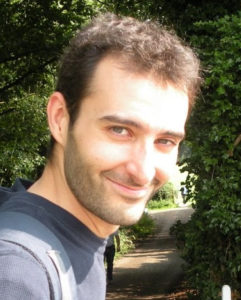Friday, April 28, 2023
11:00am-12:00pm
Bahen Centre (BA 1240)
40 St George St
Mario Ventresca, Industrial Engineering at Purdue University

A Novel Stochastic Antibody Landscape-based Model of Antigenic Disease Spread
Abstract:
The burden of infectious diseases is predominantly caused by antigenically variable pathogens, such as influenza, dengue, foot-and-mouth, and HIV. Unlike other pathogens (e.g. tetanus, hepatitis A & B, measles), these are capable of undergoing significant antigenic drift, which results from mutations and/or genetic instability, that cause the shape of the virus to change and thereby rendering it difficult for the host immune system to recognize and neutralize it. Typically, competing co-circulating strains exist and undergo antigenic drift until at least one antigenically novel strain can evade (sub)population immunity and rapidly spread. This constantly moving genetic and antigenic target is the major obstacle for the development of new or improved vaccines, which remain a cornerstone of public health policy and the best approach to controlling the spread of disease.
Unfortunately, there typically exists a significant lag time (usually 6-12 months) between when vaccine design recommendations are made (e.g., at the WHO) and when manufacturers can deliver the vaccine. This is a critical practical concern given the uncertainty in mutations that may occur within that span, their spreading patterns, and the subsequent costs of vaccine mismatch on morbidity, mortality, and the economy. As an example, the yearly Influenza vaccine typically has 40-60% efficacy, falling to 10-30% during seasons when an antigenically novel strain is introduced. It is therefore evident that significant societal benefit could result by improving prediction accuracy concerning (a) when a significant antigenic change may occur, (b) the impact of the choice of virus strain included in the vaccine on population immunity levels, and (c) the impact of selecting a particular strain on the long term evolutionary trajectory of the virus. Unfortunately, addressing these concerns using existing models fails miserably. In this presentation I will present a novel stochastic model based on antibody landscapes and demonstrate that it has the potential to address these aforementioned challenges due to its ability to realistically account for (1) host immune history, (2) consequent population-level immunity, (3) social interaction dynamics, as well as (4) mutations that may impact antigenicity and subsequent susceptibility of individuals based on (1). Results will be highlighted using global spread data from the canonical example of seasonal influenza, which accounts for approximately 65% of the total economic burden of vaccine-preventable diseases.
Bio:
Mario Ventresca is an Associate Professor of Industrial Engineering at Purdue University, and was on sabbatical leave at The University of Toronto for 2022. Prior to joining Purdue he held postdoctoral positions at The University of Toronto (Mechanical and Industrial Engineering) and Cambridge University (Zoology), which followed his PhD from The University of Waterloo (Systems Design Engineering), MS at Guelph University (Computer Science), and undergraduate degree at Brock University (Computer Science). His research focuses on developing models and algorithms for analyzing, predicting, designing, optimizing, and controlling complex systems in order to discover deeper scientific insight and achieve operational/design outcomes. Recent major research projects include large-scale stochastic and deterministic models of disease spread and mitigation, robust generative models of complex networks, novel statistical methods for analyzing human brain network structure/function relationships, devising intelligent algorithms for better resource allocation when mitigating human traficking and illegal opiod spread, analyzing and designing equitable public health policies for vaccine distribution, and various state-of-the-art combinatorial optimization algorithms for vehicle routing, infrastructure design, and auction problems.
